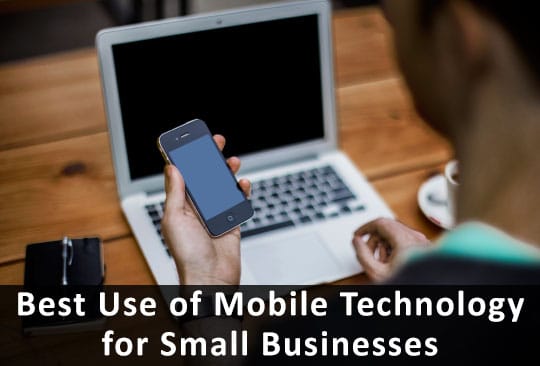What Are The Most Effective Mobile Technology Options For Businesses?
When it comes to mobile technology,
there are a variety of options available to businesses. Some of these include
mobile apps, mobile banking and retail POS systems. The key to a successful
mobile strategy is to know which technology is right for your specific needs.
Mobile Apps
Mobile technology is a growing part
of the modern business landscape. It's no longer just a matter of having a
presence on social media. In today's world, it's more important than ever to
offer a digital service that provides users with what they need. One of the
most effective ways to do this is by creating a mobile app. Apps can help your
business streamline processes, get employees to work more efficiently, and even
improve your marketing efforts.
The possibilities are almost
limitless. However, if you want to build an app for your business, you'll need
to ensure you're getting the best return on your investment. There are a few
things you need to know to get started. First, you'll need to decide who your
target audience is. You'll also need to figure out how to get them to your app.
An excellent place to start is with a loyalty program. This can give you a leg
up on the competition regarding customer acquisition.
Mobile Banking
If you are considering a new mobile
technology for your business, there are several things you need to consider.
Some of the most important features include security, speed and versatility.
Finding a mobile solution that meets your business needs can be challenging. A
well-developed app can streamline your customer experience. For example, use a
QR code to inform customers about a special offer. The same technology could
also be used to make payments. You can also implement cloud technology to help
your team increase productivity, even if they are out of the office.
This allows you to access documents
and applications from anywhere. Your customers can also use your mobile app to
book appointments and make purchases. There are even some businesses that are
making the switch to contactless payment methods. These can save you money, as
well as time and fuel. You can also leverage GPS and near-field communication
to improve your delivery routes. When done correctly, this can increase the efficiency
of your business.
Mobile Retail POS Systems
Mobile retail POS systems can
provide your business a wide range of benefits. For example, these devices help
you save time at checkout and enhance your customer experience. The best POS
providers are responsive to your needs and offer 24-hour support. They should
also be able to communicate with you via the method you prefer. When selecting
a POS system, it's essential to understand your goals and budget.
Depending on your needs, you may
need a mobile or cloud-based solution. Some POS systems are primarily built for
payment processing, while others include more extensive CRM features. Your POS
system should help you track inventory and sales, manage employee information,
and print customer receipts. Most POS systems are hosted on a cloud, so you
don't need additional hardware.
Besides, a cloud-based POS solution
allows you to access it from different devices, including your smartphone. With
a POS app, you can use your smartphone to process payments, store debit card or
credit card information, and retrieve your customer carts later. These
solutions can also be accessed from anywhere with a Wi-Fi.
Near Field
Communications (NFC)
NFC is a short-range, half-duplex
wireless communication technology. It is used for contactless communications
based on the inductive coupling principle. The technology is compatible with
innovative card standards. Near Field Communication contributes to the Internet
of Things, Cloud Computing, and Ubiquitous/Pervasive Computing.
Research is being conducted on NFC
from a business, academic, and research perspective. Researchers have recently
studied the integration of WSNs with NFC in healthcare monitoring systems. NFC
provides a secure and standardized way of storing formatted data on an NFC tag.
This ensures accurate data exchange between a mobile device and a healthcare
system. Consequently, it helps provide proper drug interactions, medication
administration, and treatment.
Aside from its role in healthcare,
NFC is also used in education. Researchers have studied the application of NFC
to the education ecosystem, including teachers, students, schools, and other
institutions. The Smart University project is a study that aims to use NFC in a
university environment. The system includes several NFC tags, servers, and
readers. It enables different use cases, such as navigation services and
guidance services.
Author Bio
Tobin John holds a PhD degree from
a prestigious university. He is associated with one of the best Business Plan Writing Services and has been providing professional business writing
services for over 15 years. After completing his Masters, he started providing
online business writing services on different platforms. Once his PhD was
completed, he professionally joined service providers and now works for them.

Comments
Post a Comment